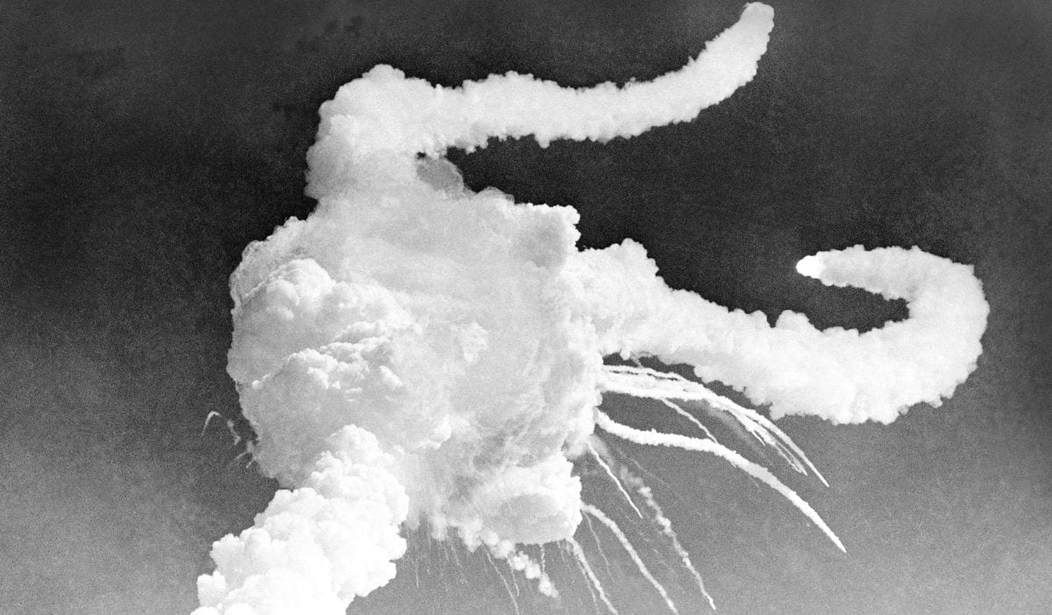January 28, 1986, dawned clear and very cold at Florida’s Cape Canaveral. Ice had formed on the launch pad where the Space Shuttle Challenger was set to take off. NASA officials, along with representatives of the manufacturer of the solid rocket booster Morton Thiokol, discussed scrubbing the mission due to the cold.
But after some objections from MT executives were duly noted, NASA decided the launch was a “go.” The agency officials determined that the cold weather — the coldest ever for a NASA manned launch — was an “acceptable risk.”
It was a special mission. The shuttle was carrying the first civilian into space — a New Hampshire teacher, Christa McAuliffe. Six other NASA astronauts also boarded the craft, looking forward to a mostly routine mission.
After what appeared to be a flawless takeoff, the Challenger exploded 73 seconds after launch.
A shocked nation gathered around their TV sets that night as President Ronald Reagan addressed the American people.
It is not hyperbole or Reagan worship to say that few presidents rose to meet an occasion as well as President Reagan did that night after the Challenger blew up. Reagan’s Brandenburg Gate speech (“Tear down this wall”) is on most Top Ten lists for presidential speeches. But the Challenger speech had a different emotional tenor altogether, evoking as it did our past, present, and future.
On the 30th anniversary of the disaster in 2016, the Washington Post’s Justin Moyer chronicled the reaction of House Speaker Tip O’Neill:
Accolades for the speech soon poured in. House Speaker Tip O’Neill (D) was known for working with Reagan rather than against him, but even his compliments were over the top.
“In O’Neill’s opinion, Ronald Reagan, with a prepared text, was simply the best public speaker he’d ever known, and that included FDR and Jack Kennedy,” MSNBC’s Chris Matthews, O’Neill’s chief of staff during much of the Reagan administration, later wrote. “It was a seasoned man’s assessment. In the case of the Challenger speech, he’d found himself personally moved and personally grateful, and, for Tip O’Neill, that meant a lot.”
Obviously, the historic moment the speech was made amplified its impact. But beyond that, the elegant and heartfelt words, crafted largely by Peggy Noonan but, as always, with Reagan’s personal touches and flourishes, hit an emotional home run, lifting the people up while honoring the sacrifice of the explorers.
Some excerpts illustrate that point:
We’ve grown used to wonders in this century. It’s hard to dazzle us. But for twenty-five years the United States space program has been doing just that. We’ve grown used to the idea of space, and perhaps we forget that we’ve only just begun. We’re still pioneers. They, the member of the Challenger crew, were pioneers.
The space program had been such a large part of our national identity for a quarter of a century that the failure of the Challenger was a punch in the gut. Evoking the image of the pioneer — the powerful and quintessentially American image — suggested an emotional connection to our storied past.
From past to future:
And I want to say something to the schoolchildren of America who were watching the live coverage of the shuttle’s takeoff. I know it is hard to understand, but sometimes painful things like this happen. It’s all part of the process of exploration and discovery. It’s all part of taking a chance and expanding man’s horizons. The future doesn’t belong to the fainthearted; it belongs to the brave. The Challenger crew was pulling us into the future, and we’ll continue to follow them.
Reagan’s rhetoric inspired, but rarely soared. The Great Communicator believed that the best speeches are given as if two people were engaged in conversation.
But that night from the Oval Office, Reagan’s quote from a poem by John Gillespie Mageee Jr., a World War II airman who died tragically in a mid-air collision, took the speech from the plane of the ordinary and sent it soaring into the stratosphere:e
The crew of the space shuttle Challenger honored us by the manner in which they lived their lives. We will never forget them, nor the last time we saw them, this morning, as they prepared for the journey and waved goodbye and “slipped the surly bonds of earth” to “touch the face of God.”
NASA announced that some of Christa McAuliffe’s lessons she planned to teach in space will finally be taught on the International Space Station. A fitting tribute to her and the crew of the Challenger who all died doing what they were born to do.










Join the conversation as a VIP Member